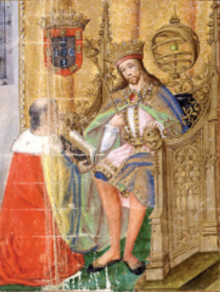Edward of Portugal
| Edward | |
|---|---|

King Duarte in Crónica d'El-Rei D. Duarte;
Rui de Pina, c. 1497–1504. |
|
| King of Portugal and the Algarve | |
| Reign | 14 August 1433 – 9 September 1438 |
| Predecessor | John I |
| Successor | Afonso V |
| Born |
31 October 1391 Viseu, Kingdom of Portugal |
| Died | 9 September 1438 (aged 46) Tomar, Kingdom of Portugal |
| Burial | Monastery of Batalha |
| Spouse | Eleanor of Aragon |
| Issue |
Afonso V of Portugal Infante Ferdinand, Duke of Viseu Eleanor, Holy Roman Empress Infanta Catherine Joan, Queen of Castile |
| House | Aviz |
| Father | John I |
| Mother | Philippa of Lancaster |
| Religion | Roman Catholicism |
| Signature |  |
Duarte (duˈaɾt(ɨ); 31 October 1391 – 9 September 1438), known in English as Edward and called the Philosopher (o Rei-Filósofo) or the Eloquent (o Eloquente), was King of Portugal and the Algarve and Lord of Ceuta from 1433 until his death. He was born in Viseu, the son of John I of Portugal and his wife, Queen Philippa of Portugal, a daughter of John of Gaunt. Edward was the oldest member of the "Illustrious Generation" of accomplished royal children who contributed to the development of Portuguese civilization during the 15th century. As a cousin of several English kings, he became a Knight of the Garter.
Before he ascended the throne, Duarte always followed his father in the affairs of the kingdom. He was knighted in 1415 after the Portuguese capture of the city of Ceuta in North Africa, across from Gibraltar, in the Battle of Ceuta. He became king in 1433, when his father died of the plague.
As king, Duarte soon showed interest in building internal political consensus. During his short reign of five years, he called the Portuguese Cortes (the national assembly) no less than five times to discuss the political affairs of his kingdom. He also followed the politics of his father concerning the maritime exploration of Africa. He encouraged and financed his famous brother, Henry the Navigator, who initiated many expeditions on the west coast of Africa. An expedition of Gil Eanes in 1434 first rounded Cape Bojador on the northwestern coast of Africa, leading the way for further exploration southward along the African coast.
...
Wikipedia
